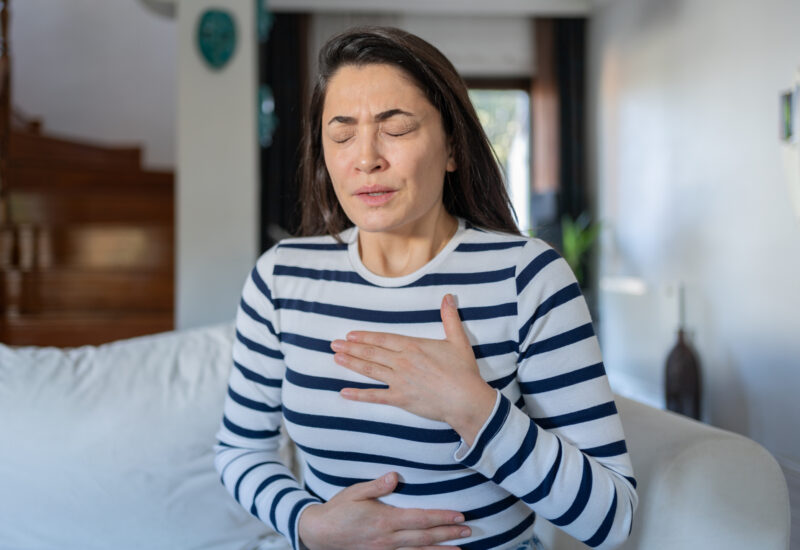
Can Anxiety Cause Chest Pain?
4 min.
Discover the causes, symptoms, and effective treatments for anxiety chest pain to help you regain control and find relief.
Imagine this: you’re going about your day when, suddenly, you feel a tightness in your chest. It’s sharp and unsettling, and your mind immediately jumps to the worst-case scenario—a heart attack. But what if this discomfort isn’t heart-related at all? For many, anxiety can trigger chest pain that feels just as alarming as a cardiac event. Understanding the connection between anxiety and chest pain can help ease fears and empower you to manage your symptoms more effectively—read on to learn more.

Get help navigating anxiety-related symptoms
Our virtual, intensive treatment offers tools and support for managing anxiety.
What is anxiety chest pain?
Anxiety chest pain is a physical symptom that occurs when your body responds to stress or fear. While it might feel similar to cardiac chest pain, it originates from your body’s heightened stress response, often tied to the fight-or-flight reaction. When anxiety strikes, your body releases adrenaline, increases your heart rate, and causes muscle tension—all of which can lead to discomfort or sharp sensations in your chest. Common feelings include chest tightness, sharp or stabbing pain, burning sensations, or pressure that can make it difficult to breathe.
What causes anxiety chest pain?
Anxiety chest pain stems from both physiological and psychological triggers:
1. Muscle tension
Anxiety can cause your chest muscles to contract, creating tightness or pain.
2. Hyperventilation
Rapid breathing disrupts oxygen and carbon dioxide levels in the body, leading to dizziness, lightheadedness, and chest discomfort.
3. Adrenaline surge
Stress triggers a release of adrenaline, causing your heart to race, leading to sensations like heart palpitations and chest tightness.
4. Mental health issues
Psychological factors such as a panic attack, panic disorder, or generalized anxiety disorder (GAD) can amplify these physical sensations, making the anxiety-related chest pain feel even more severe.
Anxiety chest pain vs. heart-related chest pain
One of the biggest challenges with anxiety chest pain is distinguishing it from heart-related issues. While both can feel similar, there are key differences:
Location
Anxiety chest pains are often sharp and localized, whereas cardiac chest pain tends to radiate to the arms, jaw, or back.
Duration
Anxiety-induced chest pain typically comes on quickly and may fade within minutes, while heart disease-related pain tends to build gradually and linger.
Associated symptoms
A heart problem may include symptoms like shortness of breath, sweating, or nausea. Anxiety symptoms often include dizziness, a sense of doom, heart palpitations, and rapid heartbeat.
When in doubt, always seek medical attention—especially if it’s your first time experiencing chest discomfort or if symptoms are severe, as they could indicate a potential heart attack symptom.
What does anxiety chest pain feel like?
People who experience anxiety-related chest pain often describe it as:
- A sharp, stabbing sensation
- Pressure or tightness, like something is sitting on their chest
- A burning feeling similar to heartburn
- Discomfort that worsens with stress but improves with relaxation
Beyond the physical sensations, anxiety chest pains can be emotionally overwhelming, increasing fear and potentially triggering a panic attack. This fear often creates a vicious cycle, where the anxiety about the chest pain itself intensifies, leading to more anxiety and further exacerbating the physical symptoms. As the fear builds, the body reacts with heightened stress responses, which can worsen the chest pain and make the individual more anxious. This cycle can make symptoms feel unmanageable and persistent, as the fear of the pain itself contributes to its continuation.
How is anxiety chest pain diagnosed?
If you’re experiencing chest pain, a healthcare provider will likely review your medical history, conduct a physical exam, and run tests, such as an electrocardiogram (EKG), to rule out heart problems like heart disease.
If physical causes are ruled out, your doctor may suggest a mental health evaluation to assess for anxiety disorders or panic disorder. A proper diagnosis ensures you’re addressing both your physical and mental health needs.
Managing and treating anxiety chest pain
Here are some tips for managing and treating anxiety chest pain in the short and long term.
Short-term relief strategies
Incorporating stress-reducing practices into your daily routine can help minimize episodes:
- Breathing exercises: Deep, slow breaths help regulate oxygen levels and calm the nervous system.
- Grounding techniques: Focusing on your surroundings can bring you back to the present and ease anxiety symptoms.
- Progressive muscle relaxation: Tensing and releasing muscle groups can reduce physical tension in your chest muscles.
It’s also helpful to have a plan if you feel chest pain anxiety coming on. These coping strategies are effective in the moment and can help interrupt the cycle of anxiety chest pain, offering immediate relief. In the event of an anxiety episode, remember these steps:
- Acknowledge your symptoms without judgment.
- Focus on your breath—inhale for four counts, hold for four, exhale for four.
- Ground yourself by noticing five things you can see, four you can touch, three you can hear, two you can smell, and one you can taste.
- Seek support from a trusted friend or mental health professional if needed.
Long-term management
- Cognitive-behavioral therapy (CBT): This form of therapy helps identify and reframe anxious thoughts contributing to noncardiac chest pain.
- Medication: Antidepressants or anti-anxiety medications can be prescribed by a healthcare provider.
- Lifestyle changes: Regular exercise, adequate sleep, mindfulness practices, and balanced nutrition can help reduce anxiety-induced chest pain.
How Charlie Health can help
If anxiety is affecting your mental health, Charlie Health is here to help. Charlie Health’s virtual Intensive Outpatient Program (IOP) provides mental health treatment for people dealing with serious mental health conditions, including anxiety, depression, trauma, and more. Our expert clinicians incorporate evidence-based therapies into individual counseling, family therapy, and group sessions. With this kind of holistic online therapy, managing your mental health is possible. Fill out the form below or give us a call to start healing today.

